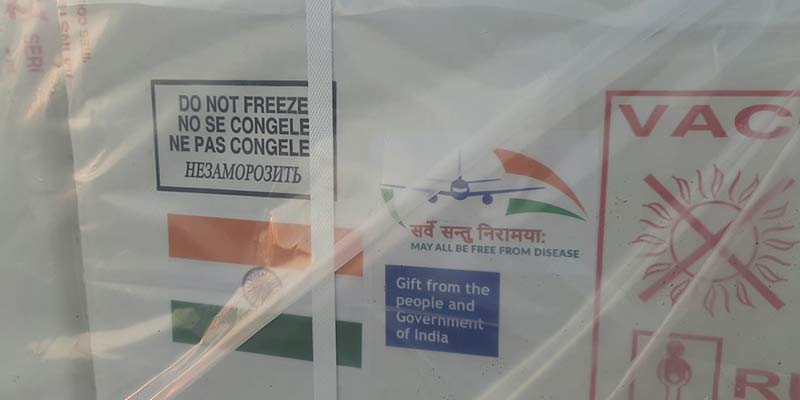- World
- Jan 30
‘Vaccine nationalism’ will prolong pandemic, warns WHO chief
WHO Director-General Tedros Adhanom Ghebreyesus said the ‘vaccine nationalism’ will prolong the COVID-19 pandemic as he expressed concern that some countries are rolling out vaccines only for their own citizens while the world’s least developed nations only wait and watch.
He was speaking at the last day of the week-long online Davos Agenda Summit of the World Economic Forum (WEF).
“If we lose trust in international collaboration through vaccine nationalism, we will all pay the price in terms of a protracted recovery,” Ghebreyesus said.
What is vaccine nationalism?
Countries putting their own interests ahead of others in trying to ensure supplies of a possible coronavirus vaccine, is referred as vaccine nationalism.
Global health agencies are trying to bulk-buy and equitably distribute vaccines around the world. However, some wealthier countries have decided to go it alone, striking deals with drugmakers to secure millions of doses of promising candidates for their citizens.
It is likely to fuel the global scramble to hoard vaccines by rich countries and feed a dangerous trend of vaccine nationalism.
The concern is that vaccine supply and allocation in this pandemic will echo the last — caused by the H1N1 flu virus in 2009/2010. Rich nations had bought up the available supply of vaccines, initially leaving poor countries with none. In that instance, since H1N1 turned out to be a milder disease and the pandemic ultimately petered out, the impact on infections and deaths from vaccine imbalances was limited.
WHO says vaccine-hogging richer countries would not be safe if poor nations remained exposed. For the world to recover faster, it has to recover together, because it’s a globalised world, the economies are intertwined. Part of the world or a few countries cannot be a safe haven and recover.
The ACT-Accelerator - a global solution
In April, the WHO launched the Access to COVID-19 Tools (ACT) Accelerator, a new global collaboration to accelerate development, production, and equitable access to COVID-19 diagnostics, therapeutics, and vaccines.
Within the Accelerator, Gavi, Coalition for Epidemic Preparedness Innovations (CEPI), and WHO together with multinational and developing country vaccine manufacturers are working on the COVAX (vaccine) Pillar to develop the COVAX Facility. The facility provides governments with the opportunity to benefit from a large portfolio of COVID-19 candidate vaccines using a range of technology platforms, produced by more manufacturers across the world, with a bigger market to provide security of demand – often with greater scope than governments or regional groups can support on their own.
The ACT-Accelerator was set up to contain the COVID-19 pandemic faster and more efficiently by ensuring that successful diagnostics, vaccines and treatments are shared equitably across all countries. Key to achieving that goal is the design and implementation of a Fair Allocation Framework.
Equitable distribution is particularly important in the area of vaccines, which, if used correctly and equitably, could help to stop the acute phase of the pandemic and allow the rebuilding of our societies and economies.
Although the ACT-Accelerator will speed up development and production, initial supplies will be limited. If there is no international plan to manage vaccine distribution fairly, there will be hoarding in some places and life-threatening shortages in others. There will also be price spikes.
So WHO advises that once a vaccine is shown to be safe and effective, and authorised for use, all countries receive doses in proportion to their population size, albeit initially in reduced quantities. This will enable every country to start by immunizing the highest priority populations.
India has gifted 55 lakh doses of vaccines to many countries
India is one of the world’s biggest drug-makers, and an increasing number of countries have already approached it for procuring the coronavirus vaccines.
India has rolled out a massive coronavirus vaccination drive under which two vaccines, Covishield and Covaxin, are being administered to frontline health workers across the country.
The Indian government has so far gifted over 55 lakh doses of coronavirus vaccines to its neighbouring countries and several of those in its extended neighbourhood, the ministry of external affairs (MEA) said.
Bhutan has been supplied 1.5 lakh doses so far and Maldives one lakh doses. Nepal and Bangladesh were given 10 lakh and 20 lakh doses respectively. Myanmar received 15 lakh doses, Mauritius one lakh doses and Seychelles got 50,000 doses. On January 28, India sent 5 lakh vaccine doses to Sri Lanka and 1 lakh doses to Bahrain as part of grants assistance. These supplies are based on requests from these countries.
Over the next few days, India plans to gift one lakh doses to Oman, five lakh doses to CARICOM countries and two lakh doses to Nicaragua. The Pacific Island states are also getting two lakh doses. The Caribbean Community (CARICOM) is a grouping of 20 island nations which are home to approximately 16 million people.
Commercial exports have taken place to Brazil, Morocco and Bangladesh and further such supplies are likely to be made to Saudi Arabia, South Africa, Canada and Mongolia.
Further, India will supply 1 crore doses to Africa and 10 lakh to UN health workers under GAVI’s COVAX facility. GAVI is a global vaccine alliance.
India will continue to supply vaccines to partner countries over the coming weeks in a phased manner.
Why is vaccination important?
Vaccination is a safe and effective way to prevent disease and save lives – now more than ever. Today there are vaccines available to protect against at least 20 diseases, such as diphtheria, tetanus, pertussis, influenza and measles. Together, these vaccines save the lives of up to 3 million people every year.
When we get vaccinated, we aren’t just protecting ourselves, but also those around us. Some people, like those who are seriously ill, are advised not to get certain vaccines – so they depend on the rest of us to get vaccinated and help reduce the spread of disease.
Manorama Yearbook app is now available on Google Play Store and iOS App Store


